Third Trimester
Weeks 28 – 42
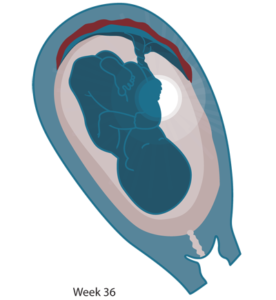
Early in this trimester your baby is able to survive if delivered, although it would still need medical help and constant monitoring in the neonatal unit. The last weeks in the womb are very important as it helps the baby’s lungs, digestive system and brain to develop further in order that they can work well when your baby is born.
By week 29 your baby will weigh about 1 kg (2.2 lbs). From now until week 32 your baby can put on as much as 500 grams (17 ounces) in weight a week. Your baby’s lungs will be producing a substance called surfactant, which the baby needs to help it breathe after birth, by helping its lungs to be as elastic as possible to be able to expand fully. You will find that your baby’s movements are much stronger and you recognise a definite pattern of movements. Your baby’s eyes are opening and closing and he or she is learning to focus. Your baby’s fingernails reach to the tips of its fingers but its toenails will still need a few more weeks to reach the end of the toes.
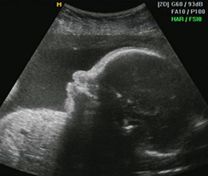
Most babies will lie head down (cephalic) by week 34 especially if it is your first baby. However, some babies will take another week or two before they will settle down in position for birth. Indeed some babies will decide to come bottom first (breech). If by 37 – 38 weeks your baby is not in the cephalic (head down) position, the doctor and midwife will talk to you about birth options. By 36 weeks your baby will weigh 3 kg (6.5 lbs) and you are now in the final lap before birth.
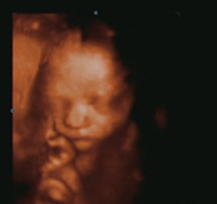
From week 36 your baby’s organs are being fine-tuned for birth; the lungs mature, and the digestive system can take liquid foods. The lanugo hair will start to disappear from your baby’s body and his or her immune system can give protection against a variety of infections. If your due date arrives and you have not gone into labour, don’t worry as this is very common, especially for first time mothers.
Your changing body: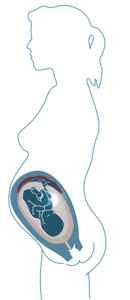
Your womb is getting bigger at a steady rate and your stomach and intestines get squashed which means you can get heartburn. Your bladder is also not used to this pressure and can no longer hold as much urine, so you may want to go to the toilet more often. Sometimes you might get a small leak of urine when you sneeze, cough or laugh; this is called stress incontinence. Some women are not sure if the baby’s waters are broken. If you are not sure you should check with your midwife or doctor. Many women will complain that they have less breath, because their womb is growing and it pushes the contents of their tummy up against their diaphragm so their lungs have less room to expand when they try to take a deep breath.
Your body needs to hold extra fluid and this generally settles on your legs and hands; because of this you will notice they may become swollen. However, if your face or legs suddenly become puffy or swollen it could be a sign of pre-eclampsia and you should go to your doctor (GP) or midwife as soon as possible.
With your growing womb you may have problems with sleeping and doing every day things such as shopping or cleaning. Lack of sleep can affect how you feel physically during the day. You should try to involve your partner as much as possible in work in the house, so that you can get some extra rest. Lying on your back can be difficult as it can lower your blood pressure and make you feel light-headed. It is best if you can lie on your side with the support of a pillow at your back. From now until the end of your pregnancy, your womb will start to practice contracting so it can prepare for labour. These tightenings are called Braxton Hicks contractions. In the beginning these can be very mild; however, near the end of the pregnancy they can become strong and uncomfortable. Emotionally, you may find it hard to concentrate on specific tasks; you can become weepy for no particular reason.
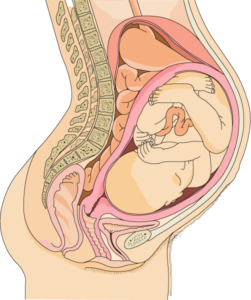
Things to do:
- Go to the doctor or midwife on a regular basis.
- Go to parent education classes with your partner.
- If you have not had a whooping cough (pertussis) vaccine in the past ten years, you should get a booster vaccine from your GP after 28 weeks, to protect yourself and your baby until it receives its own vaccines.
- Keep active and eat well.
- Pack your bag for birth and plan a route to the hospital.
- Have a back-up child minder if you have other young children.
